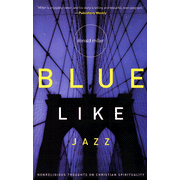 Donald Miller would like to introduce you to "Christian spirituality." If you’re a Christian, he wants you to consider a less dogmatic and stodgy way. And if you’re a nonbeliever, he would like to introduce you to Jesus through Christian spirituality. But first he must introduce himself. He just wants you to know that he likes you, and if you were to meet, he would listen to your story. He even thanks you for listening to his story right there at the end of the book. Jesus is of course the same way. He likes you, wants to listen to your story, and wants you to hear his.
Donald Miller would like to introduce you to "Christian spirituality." If you’re a Christian, he wants you to consider a less dogmatic and stodgy way. And if you’re a nonbeliever, he would like to introduce you to Jesus through Christian spirituality. But first he must introduce himself. He just wants you to know that he likes you, and if you were to meet, he would listen to your story. He even thanks you for listening to his story right there at the end of the book. Jesus is of course the same way. He likes you, wants to listen to your story, and wants you to hear his.
Blue Like Jazz is Don’s story—and one is immediately on a first name basis with Miller. It’s about his experiences leading up to his arrival at "Christian spirituality," which might be best described as the parts of historical Christianity that make sense to Don. He’s got Jesus, a vague relationship with the local church, a sin nature, and some questions about the "mechanics" of the Trinity.
This is presented to the reader in a free flow of autobiographical "new-realism" essays and cartoons. Yet underneath the story is a critique of the modern American church and culture. It’s a cool postmodern critique, detached yet thoughtful and self-deprecating. He is even cool when describing how un-cool he is. Somehow he manages to criticize Western individualism without a hint of irony while using the word "I" constantly.
Since the author embraces a postmodern style, he does not provide his reader with an interpretive framework. Was it wrong for him to get drunk and smoke pot while he was leading his high school youth group? Is the story of his friend’s conversion evidence of the failure of the 60s’ drug culture or her parents being inconsistent hippies? The reader is left to discover such answers on his own.
Don wants to invite the reader to authentic Christian spirituality, but he’s not really sure what it looks like. He can only report back what he’s experienced—and it’s been a confusing trip. This means that some of his readers will walk away even more confused, but more resolved to get another tattoo, another piercing, grow those dreads, attend another anarchist protest, or say another profanity. They will learn that watching South Park is not so bad, having crushes on lesbian pop stars is cool, and that smoking pot is an ambiguous moral question. Taken in isolation these are petty sins, but as a lifestyle they draw people away from Christ by confusing who he is and inhibiting the joyful freedom experienced in obedience to him.
Donald Miller is making an earnest attempt to witness to nonbelievers and disciple Christians, but he doesn’t distinguish between being relevant and being worldly. In his critique of the traditional church, Christian coolness becomes evangelistic relevance. Miller is aware that this is problematic, but only in the case where coolness leads to absolute relativism. In the sense that being cool leads to immaturity and sin, here he stumbles. And it is his quest for and familiarity with the cool that makes his book extremely popular with young Christians. He speaks with their voice, describes their longings, and enforces their fundamental assumptions. Yet, he is never able to transcend their experiences to assist them to the next step in their Christian maturity.
As an evangelistic tract Blue Like Jazz is too narrow. Jesus is presented as a nice fellow who meets one at the campfire and swaps stories. He’s a listener, a friend, accepting, warm, kind, and gentle. And Jesus is all these things. But the meta-narrative of the Bible, also reminds us that Jesus is terrible. He is the judge, the king, the warrior, the avenger (Rev. 19:2). The good news is not merely that Jesus wants to listen to your story, but rather that he wants to save you from his just wrath.
The postmodern convert who comes to Christ the friendly listener has yet to meet the authentic Jesus. He’s met the aspects of Jesus that are most comforting to contemporary Westerners, but he has never experienced the stripping bare of all fleshly dignity before the reigning king of the universe. And this nakedness before God is necessary for salvation.
Likely, right now someone in your church is reading Blue Like Jazz or some similar book. It will resonate with them in style and content—it is cool and Christian. And it is extremely unhelpful. The only antidote seems to be twofold. The first is to reintroduce young Christians to the biblical Jesus: the person who died an agonizing death for their sins, who will tread the winepress of the wrath of God, and who listens to their prayers. The second is to begin the battle against the cool. The godly must begin to prove in the pulpit, in writing, and in their lives that Christianity is the deadly enemy of the cool. And the cool is the Western postmodern entertainment driven culture that has tutored our children and ourselves for the last fifty years.


